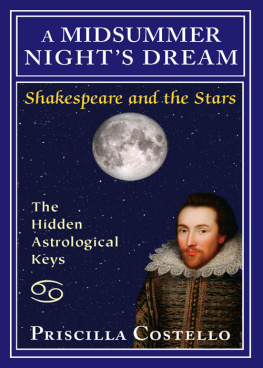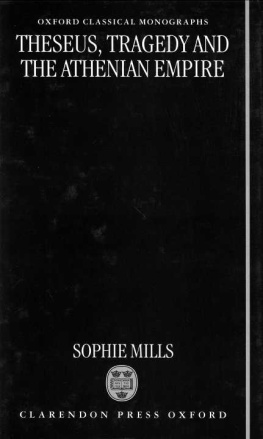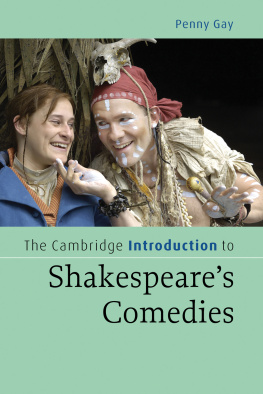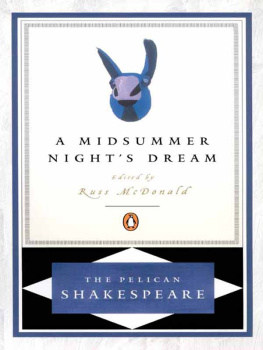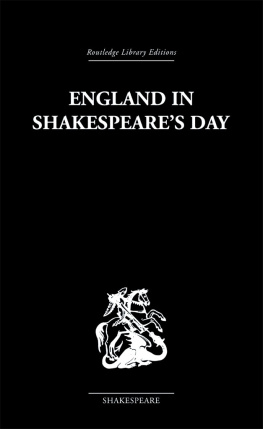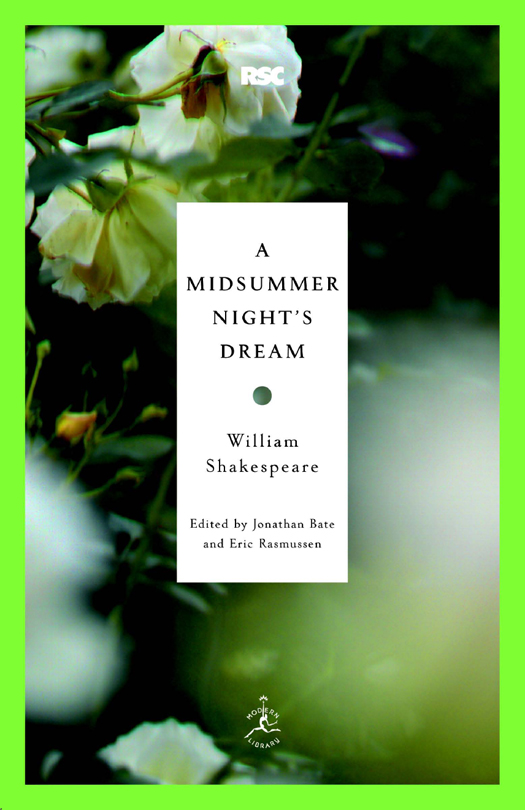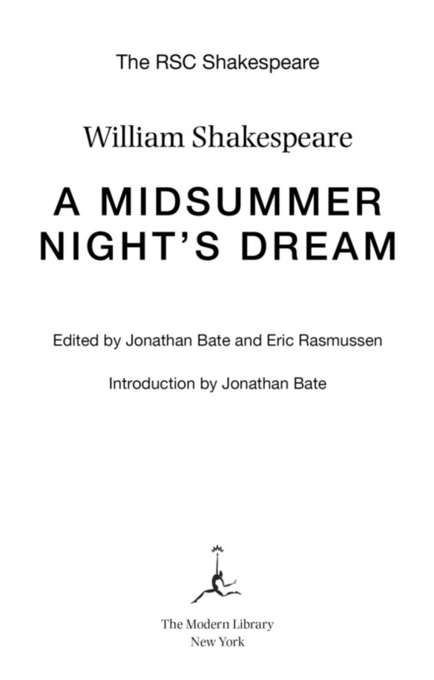The RSC Shakespeare
Edited by Jonathan Bate and Eric Rasmussen
Chief Associate Editor: Hlose Snchal
Associate Editors: Trey Jansen, Eleanor Lowe, Lucy Munro, Dee Anna Phares, Jan Sewell
A Midsummer Nights Dream
Textual editing: Eric Rasmussen
Introduction and Shakespeares Career in the Theater: Jonathan Bate
Commentary: Eleanor Lowe and Hlose Snchal
Scene-by-Scene Analysis: Esme Miskimmin
In Performance: Karin Brown (RSC stagings), Jan Sewell (overview), Jonathan Bate (captions)
The Directors Cut (interviews by Jonathan Bate and Kevin Wright):
Michael Boyd, Gregory Doran, Tim Supple
Editorial Advisory Board
Gregory Doran, Chief Associate Artistic Director, Royal Shakespeare Company
Jim Davis, Professor of Theater Studies, University of Warwick, UK
Charles Edelman, Senior Lecturer, Edith Cowan University, Western Australia
Lukas Erne, Professor of Modern English Literature, Universit de Genve, Switzerland
Maria Evans, Director of Education, Royal Shakespeare Company
Akiko Kusunoki, Tokyo Womans Christian University, Japan
Ron Rosenbaum, author and journalist, New York, USA
James Shapiro, Professor of English and Comparative Literature, Columbia University, USA
Tiffany Stern, Fellow and Tutor in English, University of Oxford, UK
2008 Modern Library Paperback Edition
Copyright 2008 by The Royal Shakespeare Company
All rights reserved.
Published in the United States by Modern Library, an imprint of
The Random House Publishing Group, a division
of Random House, Inc., New York.
M ODERN L IBRARY and the T ORCHBEARER Design are registered trademarks
of Random House, Inc.
Royal Shakespeare Company, RSC, and the RSC logo are trademarks or registered trademarks of The Royal Shakespeare Company.
eISBN: 978-1-58836-829-4
www.modernlibrary.com
v3.1
CONTENTS
INTRODUCTION
Shakespeare is the poet of double vision. The father of twins, he was a mingler of comedy and tragedy, low life and high, prose and verse. He was a countryman who worked in the city, a teller of English folktales who was equally versed in the mythology of ancient Greece and Rome. His mind and world were poised between Catholicism and Protestantism, old feudal ways and new bourgeois ambitions, rational thinking and visceral instinct. A Midsummer Nights Dream is one of his truly essential works because nowhere else is his double vision more apparent than in this plays movement between the city and the wood, day and night, reason and imagination, waking life and dream.
MAGICAL THINKING
Wood, night, imagination, dream. These are the coordinates of the second form of sight, which is best described as magical thinking. It is the mode of being that belongs to visionaries, astrologers, wise women, and poets. It conjures up a world animated with energies and spirit forces; it finds correspondences between earthly things and divine. The eye that sees in this way rolls in a fine frenzy, as Theseus says, glancing from heaven to earth, from earth to heaven. It bodies forth / The forms of things unknown, Turns them to shapes and gives to airy nothing / A local habitation and a name.
Magical thinking answers a deep human need. It is a way of making sense of things that would otherwise seem painfully arbitrarythings like love and beauty. An ugly birthmark on a baby would be explained away by the suggestion that the infant might be a changeling child, swapped in the cradle by some night-tripping fairy. The sheer chance involved in the process of what we now call sexual chemistry may be rationalized in the story of the magic properties of the juice of the flower called love-in-idleness. And in a world dependent on an agricultural economy, bad harvests were somehow more palatable if explained by the intervention of malicious sprites upon the vicissitudes of the weather.
In the age of candle and rushlight, nights were seriously dark. The night was accordingly imagined to be seriously different from the day. The very fact of long hours of light itself conferred a kind of magic upon midsummer night. This is the night of the year when magical thinking is given full rein. For centuries, the summer solstice had been a festive occasion celebrated with bonfires, feasting, and merrymaking.
Theseus and Hippolyta never meet Oberon and Titania. In the original performance, the respective roles were likely to have been doubled. The contentious king and queen of fairies thus become the dark psychological doubles of the betrothed courtly couple. The correspondence inevitably calls into question the joy of the match between Athenian and Amazon. Oberon actually accuses Titania of having led Theseus through the glimmering night when he deserted Perigenia whom he ravishd, of having made the day duke break faith with a succession of paramours. Shakespeare loves to set up an antithesis, then knock it down. Here he implies that there is ultimately no sharp distinction between day and night: the sexual ethics of Theseus are perhaps as dubious as those of the adulterous child-possessor Titania.
Authority figures, representatives of the day world of political power, win little sympathy in A Midsummer Nights Dream. For the lovers, the forest may be a place of confused identity, but at least it is an escape from the patriarchal matchmaking of Egeus. In the audience, the characters with whom we engage most warmly are neither monarchs nor lords, but the mischief-making Robin Goodfellow and the ineffable weaver, Bottom. Each in his way is an embodiment of the theatrical spirit that animates everything that is most gloriously Shakespearean. Always a man of the theater, Shakespeare lives in a world of illusion and make-believe that hits at deepest truths; he knows that his world is fundamentally sympathetic to those other counter-worlds which we call dream and magic.
Robin the Puck compares the mortals to fools in a fond pageant: he has a right to think of himself as author of the play, since it is his dispensing of the love juice that fuels the plot. As for Bottom, at one level he is a bad actor. In both rehearsal and performance of Pyramus and Thisbe, it becomes clear that he does not really understand the rules of the theatrical game. But at a deeper level, he is a true dramatic genius: he is gifted with the childs grace to suspend his disbelief. As Pyramus, he puts up a pretty poor performance; as Ass, it is another matter. The comic deficiency of Pyramus and Thisbe is that the actors keep telling us that they havent become their characters. The Assification of Bottom is, by contrast, akin to those brilliant assumptions of disguiseRosalind becoming Ganymede in As You Like It, Viola as Cesario in Twelfth Nightthrough which Shakespeare simultaneously reminds us that we are in the theater (an actor is always in disguise) and helps us to forget where we are (we willingly suspend our disbelief). In that forgetting, we participate in the mystery of magical thinking. With Bottom himself, we in the audience may say I have had a most rare vision.
Many members of Shakespeares original audience, steeped as they were in the New Testament, would have recognized Bottoms account of his dream as an allusionwith the attributes of the different senses comically garbledto a famous passage in the First Epistle to the Corinthians, in which St. Paul says that the eye of man has not seen and the ear of man has not heard the glories that will await us when we enter the Kingdom of Heaven. In the Geneva translation of the Bible, which Shakespeare knew well, the passage speaks of how the human spirit searches the bottom of Gods secrets. Jesus said that in order to enter his kingdom, one had to make oneself as a child. The same may be said of the kingdom of theater. It is because Bottom has the uncynical, believing spirit of a child that he is vouchsafed his vision. At the same time, Shakespeare himself offers a dangerously grown-up image of what heaven might be like: the weaver may be innocent but the fairy queen is an embodiment of sexual experience. The virgin queen Elizabeth was also known as Englands fairy queen and the wood in which the action takes place, with its nine mens morris and English wildflowers, is more domestic than Athenian, so there must have been an inherent political risk in the representation of a sexually voracious Titania. Shakespeare perhaps introduced Oberons apparent allusion to a chaste Elizabeththe fair vestal thrond by the westin order to dismiss any identification of Titania with the real-life fairy queen who he knew would at some point be a spectator of the play.


